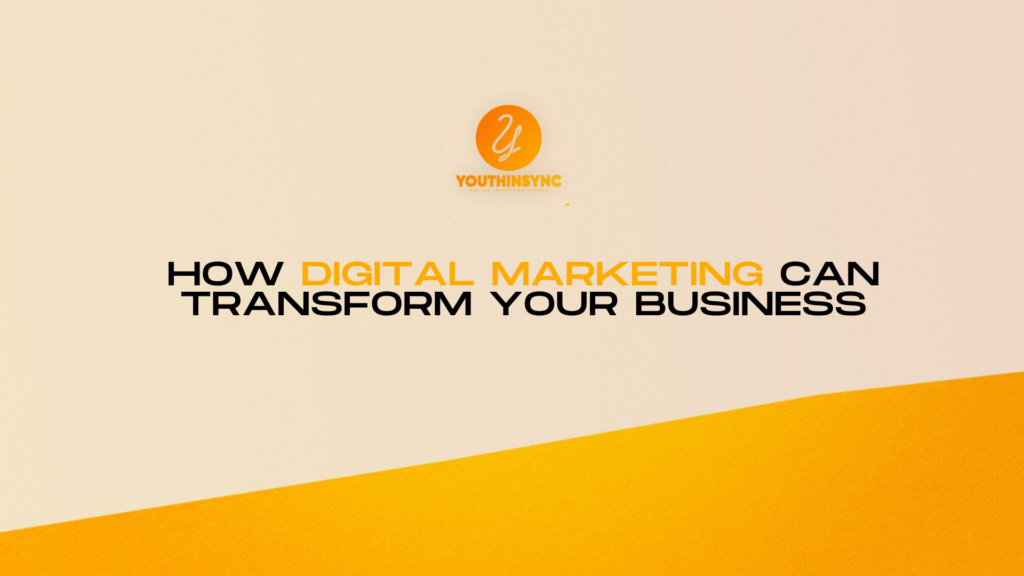Introduction
In today’s hyper-connected world, digital marketing has become the backbone of successful businesses. Whether you’re a small local shop or a global enterprise, digital marketing offers a range of tools and strategies that can transform how you engage with customers, enhance your brand’s visibility, and ultimately, drive business growth. This article dives deep into the core advantages of digital marketing and explains how it can be a game-changer for your business.
Digital marketing is no longer just an option; it’s a necessity in the modern marketplace. The shift from traditional marketing methods to digital channels has opened up unprecedented opportunities for businesses to reach their target audience more effectively. Whether through social media, content marketing, or search engine optimization (SEO), digital marketing enables businesses to connect with customers in ways that traditional marketing simply cannot match.
This comprehensive guide outlines how digital marketing can significantly benefit your business. From increasing your reach to driving revenue growth, the benefits of digital marketing are vast and varied. Let’s explore each key advantage in detail.
1. Increased Reach and Global Audience
One of the most compelling benefits of digital marketing is its ability to reach a global audience. Unlike traditional marketing, which is often restricted by geography and budget, digital marketing allows businesses to extend their reach across borders. Through channels like social media, email marketing, and search engines, businesses can target specific demographics and connect with customers on a global scale.
In addition, digital marketing platforms provide scalability, making it easier for small businesses to compete with industry giants. For example, a local craft store can use social media to attract international customers by showcasing unique products to a broad audience. By tapping into global markets, businesses can unlock new revenue streams and opportunities for growth.
Moreover, digital marketing offers precise targeting options. You can reach specific audiences based on location, age, interests, and even behaviors. This level of targeting ensures that your marketing efforts are more effective and result in higher engagement rates.
The potential to reach a global audience is further enhanced by the accessibility of digital platforms. Nearly everyone today has access to the internet, allowing businesses to connect with audiences 24/7. This continuous availability allows businesses to generate leads, engage with customers, and drive sales around the clock.
2. Cost-Effectiveness Compared to Traditional Marketing
Digital marketing offers a cost-effective alternative to traditional marketing strategies. Traditional methods like television ads, billboards, and print media can be expensive and are often out of reach for small and medium-sized enterprises (SMEs). Digital channels, on the other hand, offer more affordable options with the added benefit of precise targeting.
Return on investment (ROI) is a critical metric for any marketing campaign, and digital marketing excels in this area. The ability to set flexible budgets, allocate spending in real time, and target specific customer segments helps businesses maximize their ROI. For example, pay-per-click (PPC) advertising allows businesses to only pay when potential customers click on their ads, making it a highly efficient way to manage marketing costs.
When comparing the costs of traditional marketing with digital marketing, the difference is significant. For instance, a billboard ad in a prime location might cost thousands of dollars per month, yet it offers no guarantee of reaching your target audience. In contrast, a well-executed social media campaign can reach thousands of highly targeted users for a fraction of the cost.
Moreover, digital marketing offers greater flexibility in terms of budget allocation. You can start with a small budget, test your campaigns, and scale them as you see positive results. This flexibility is particularly beneficial for startups and small businesses that need to carefully manage their marketing expenses.
3. Enhanced Customer Engagement and Personalization
In today’s digital landscape, customer engagement is crucial for building strong relationships and driving conversions. Digital marketing enables businesses to create personalized experiences that resonate with their audience. Personalization tactics, such as segmented email campaigns, targeted social media ads, and personalized content, help increase engagement and build trust.
Moreover, digital marketing offers a wealth of data and insights into customer behavior, preferences, and interests. By leveraging this data, businesses can deliver tailored content and offers that align with each customer’s journey. For instance, personalized product recommendations or special discounts can significantly improve customer satisfaction and loyalty.
The interactive nature of digital marketing platforms also fosters two-way communication. Customers can engage with brands through comments, reviews, and social media interactions, providing valuable feedback that can be used to refine marketing strategies.
Personalization is key to building stronger customer relationships. Studies show that personalized marketing not only boosts engagement but also leads to higher conversion rates. When customers feel that a brand understands their needs and preferences, they are more likely to make a purchase and remain loyal.
Beyond engagement, digital marketing allows businesses to track user interactions in real-time. You can monitor click-through rates, social shares, comments, and other metrics that reflect how well your content is resonating with your audience. This level of insight enables you to continuously refine your approach and offer more relevant content to your target audience.
4. Measurable Results and Data-Driven Insights
One of the standout features of digital marketing is its ability to provide measurable results. Unlike traditional marketing, where it’s challenging to track performance, digital channels offer precise data on how campaigns are performing. Metrics such as click-through rates (CTR), conversion rates, website traffic, and engagement levels allow businesses to measure the effectiveness of their marketing efforts.
Data-driven insights are essential for optimizing campaigns and improving ROI. For example, A/B testing helps businesses determine which versions of ads, emails, or landing pages perform best. By analyzing these metrics, businesses can make informed decisions, adjust their strategies, and continuously improve their marketing tactics.
In addition, advanced analytics tools enable businesses to track customer journeys from initial contact to final conversion. This comprehensive view of customer interactions provides invaluable insights that can be used to enhance user experience and drive better results.
The ability to measure results in real-time is a major advantage of digital marketing. You can see which campaigns are driving traffic, generating leads, and converting customers. This real-time data allows you to make quick adjustments and optimize your strategies for better performance.
Furthermore, data-driven insights empower businesses to be more strategic. Instead of guessing which tactics will work, you can rely on solid data to guide your decisions. Whether it’s adjusting your budget, tweaking your messaging, or refining your target audience, data-driven strategies lead to more effective marketing.
5. Building Brand Awareness and Trust
Establishing a strong online presence is key to building brand awareness and credibility. Digital marketing plays a significant role in helping businesses create a recognizable brand identity through consistent messaging, high-quality content, and strategic use of online platforms.
Content marketing, search engine optimization (SEO), and social media marketing are powerful tools for enhancing brand visibility. A well-executed SEO strategy ensures that your brand appears prominently in search engine results, attracting more organic traffic. By consistently publishing valuable content that addresses customer pain points and interests, businesses can position themselves as industry leaders and build trust with their audience.
Furthermore, social proof, such as customer testimonials, reviews, and case studies, enhances credibility. Consumers are more likely to trust a brand that has positive reviews and success stories, which can be effectively showcased through digital marketing efforts.
A strong brand presence is essential for long-term success. When your audience recognizes and trusts your brand, they are more likely to choose your products or services over competitors. Digital marketing helps you build this trust by maintaining consistent branding across multiple channels and continuously engaging with your audience.
In addition, digital marketing allows you to build brand loyalty through customer relationship management (CRM) tools and techniques. By delivering consistent value and addressing customer needs, you can turn one-time buyers into loyal advocates of your brand.
6. Flexibility and Adaptability in Campaign Strategies
The dynamic nature of digital marketing allows businesses to remain agile and responsive to changes in the market. Unlike traditional marketing campaigns, which often require significant time and resources to adjust, digital marketing strategies can be tweaked in real time based on performance data and audience feedback.
This flexibility is particularly valuable in today’s fast-paced environment, where trends and customer preferences can shift rapidly. Businesses can quickly pivot their messaging, experiment with new content formats, and respond to current events, ensuring that their marketing remains relevant and effective.
For instance, if a social media campaign is underperforming, marketers can instantly modify targeting parameters, update creatives, or reallocate budget to channels that deliver better results. This adaptability not only optimizes performance but also helps businesses stay ahead of competitors.
Being able to quickly adapt your marketing strategy is crucial for staying relevant in a competitive market. If a particular tactic isn’t delivering the desired results, digital marketing platforms allow you to pivot quickly and try new approaches without the long lead times associated with traditional campaigns.
Flexibility also extends to testing and experimentation. Digital marketing encourages continuous experimentation with different content formats, targeting options, and messaging strategies. By testing multiple variations and learning from the results, businesses can identify what works best for their audience and refine their approach.
7. Improved Conversion Rates and Revenue Growth
Ultimately, the goal of any marketing strategy is to drive conversions and generate revenue. Digital marketing offers numerous tactics to improve conversion rates and boost sales. Techniques such as retargeting ads, email marketing automation, and conversion rate optimization (CRO) are designed to guide potential customers through the sales funnel more effectively.
For example, retargeting campaigns remind users who have previously interacted with your brand but haven’t yet converted, encouraging them to complete their purchase. Similarly, optimizing landing pages
Conclusion
Digital marketing is more than just a trend; it’s a transformative force that can propel your business to new heights. From expanding your reach to enhancing customer engagement, digital marketing provides a wealth of benefits that traditional methods simply can’t match. As businesses continue to navigate an increasingly digital world, those that leverage digital marketing strategies will be better positioned to thrive in the competitive landscape.
By embracing the advantages of digital marketing, you not only enhance your brand’s visibility and credibility but also build lasting relationships with customers. Whether you’re a startup or an established enterprise, investing in digital marketing is essential for sustained growth and success.

